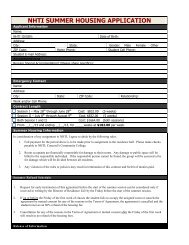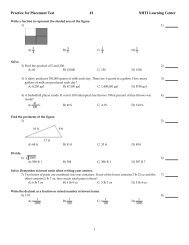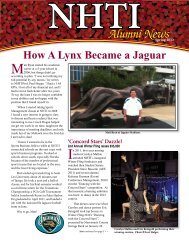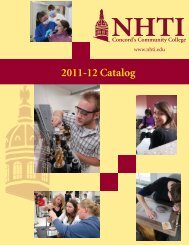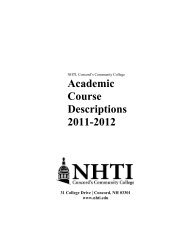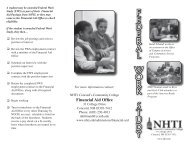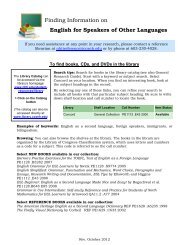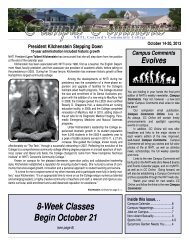NHTI Learning Center Academic Success Study Skills Section II ...
NHTI Learning Center Academic Success Study Skills Section II ...
NHTI Learning Center Academic Success Study Skills Section II ...
Create successful ePaper yourself
Turn your PDF publications into a flip-book with our unique Google optimized e-Paper software.
ACADEMIC SUCCESS Your Guidebook to <strong>Learning</strong> Styles and Improved <strong>Study</strong> Strategies NH Technical Institute <strong>Learning</strong> <strong>Center</strong> Colleen Bolton, M.Ed., and Deborah Carley, M.Ed.
<strong>Study</strong> <strong>Skills</strong><strong>Study</strong> habits can be learned and refined through practice and evaluation.Making small changes in your study behaviors can make significantchanges in your mastery of course material.The purpose of this booklet is to:9 Help you identify the way(s) you learn best 9 Provide insight into your style of thinking 9 Help you plan, implement and control the strategies that enhance learning9 Offer practical, “Tried and True” advice based on sound learningtheory9 Teach effective study habits that can be learned and refined throughpractice and evaluation<strong>Section</strong> I of this booklet provides you, the reader, with tools forunderstanding how you learn. By identifying how you learn, you will beable to incorporate skills specific to your learning style as you study. Itanswers the question, “How do I learn?”<strong>Section</strong> <strong>II</strong> helps you identify study areas needing improvement andprovides concrete advice to become a more efficient learner. It answers thequestions, “How can I improve my study skills and behaviors?”<strong>Study</strong> skills are the potentials for action and success.<strong>Study</strong> behaviors are the actions themselves.
<strong>Section</strong> <strong>II</strong> How can I improve my study skills?Contents: Where are my trouble spots?Time Management 20 Ways to Get Back Your Life Time Management=How to Get Stuff Done Semester Deadlines Weekly Schedule Things to do Today Reading Text Books Thinking While ReadingTaking Notes Your Notetaking Know-HowLecture Notes=<strong>Learning</strong> NotesTwo-Column Notes <strong>Study</strong> Groups <strong>Study</strong> Groups: The Great Grade Boosters Taking Tests Part A: Preparing for Exams Different Tests/Different <strong>Study</strong> Techniques Part B: What Went Wrong TEST S.M.A.R.T.S.<strong>Learning</strong> From Your Mistakes Test Anxiety Self-Assessment What Causes Your Test Anxiety p. 11p. 12p. 13p. 14p. 15p. 16p. 17p. 18p. 19p. 20p. 21p. 22p. 25p. 26p. 27p. 28
Where are my trouble spots?By looking at the following questions, you can identify those areas where your skills and behaviorsneed improvement. If you have difficulty answering any of the questions, consult the correspondingsection(s) of this booklet for guidance.I. Time Management I have a job, a family and friends and now I am going to college. How am I going to get everything done?How can I get myself organized to study?<strong>II</strong>. Reading Textbooks Next week’s reading assignment is 120 pages long. How do I identify what is important in that reading?How can I make sure I understand what I am reading?<strong>II</strong>I. Taking Notes My professor lectures for 50 minutes, three times each week. How can I take good and complete notes?How do I use my notes to learn the information covered in lectures?IV. <strong>Study</strong>ing with Others I seem to learn better if I work with others. Should I be part of a study group?How can I start a study group?V. Taking Exams Part A: Preparing for Exams I have an exam in two weeks. How will I know what will be on the test?Is there a difference between studying Anatomy and Physiology and Western Civilization?Part B: What went wrong?I thought I was completely prepared for this test, but I still did poorly. How can I figure out wheremy studying went wrong?I know the material when I attend class and study at home, but when I get a test, my mind goes blankand I freeze. How can I overcome test anxiety?
20 Ways to Get Back Your Life1. Plan 2-3 hours of study time for each hour in class. 2. <strong>Study</strong> your most difficult, or most boring, subjects first. 3. <strong>Study</strong> for frequent, 30-40 minute periods of time. 4. Be aware of your best time of day for thinking and remembering. 5. Use waiting time. (For example, study flash cards while waiting in line at the car wash.) 6. Use a regular study area. 7. Don’t get TOO comfortable. 8. <strong>Study</strong> in a library or come to the <strong>Learning</strong> <strong>Center</strong>. 9. Practice concentrating and focusing. 10. Agree with living mates about study time. 11. Avoid noise and visual distractions. 12. Stop letting others misuse your time. 13. Get off the phone and email. Turn off the TV! 14. Learn to say “NO”. 15. Hang a “DO NOT DISTURB” sign on your door. 16. Break large tasks into small tasks. 17. Give yourself positive feedback and rewards. 18. Identify how you waste time and STOP. 19. Reward yourself for a job well done. 20. Make managing your time a habit. Managing your time is a habit, and like all habits, it takes time to practice and refine. If your firstattempts are unsuccessful, let them go and try again.You can take back your life!
SEMESTER DEADLINES1. Write in the date of each week next to the corresponding week number.2. Write in the names of each of your courses, going across the course columns.3. In the proper week column by date, using your syllabus as a guide, make note of every paper,report, project, exam, etc. and when it is due this semester.WEEK Course Title Course Title Course Title Course Title Course Title123456789101112131415
Schedule for week of _______________20,___ to _________________ 20, __Time8:008:309:009:3010:0010:3011:0011:3012:0012:301:001:302:002:303:003:304:004:305:005:306:006:307:007:308:008:30MondayTuesdayWednesdayThursdayFridaySaturdaySunday
THINGS TO DO TODAY TaskTime NeededDone_____________________________________________________________________________________________________________________________________________________________________________________________________________________________________________________________________________________________________________________________________________________________________________________________________________________________________________
“Thinking at its highest is asking the right question.”Socrates, c. 470-399 B.C.Thinking while ReadingThink ahead:1. What is this selection about?2. What do I already know about it?3. What do I want to find out?4. What is my learning goal for this assignment?5. What kinds of reading strategies are necessary for me to meet my goal?Think while reading:6. What have I read about so far?7. Do I understand what I have read?8. If I don’t understand, what should I do?9. What is the author saying, and what do I think about it?Think back:10. Do I remember what I read?11. Have I learned what I wanted? Did I achieve my goal?12. How can I use what I read?The SQ3R method of textbook reading guides the questioning, interactive thinking that characterizes efficient, effective reading for comprehension and remembering. Once this method is mastered, students find that they no longer need to re-read and re-read textbook selections and that they often predict (and therefore, answer) test questions. Survey: (before class) Skim textbook Purpose? To prep yourself for class, and to get a general idea of the topic, the number of sub-topics, new vocabulary and concepts, and examples and visuals to refer to when you study. Pay attention to the chapter title and objectives, headings and subheadings, and highlighted terms. Read the chapter summary. Question: (before class) Turn each bold heading into question by preceding it with who, what, where, when, why, or how. Purpose? To set a purpose for reading the material in more detail at a later time. Our minds are programmed to seek answers to questions; the college environment stimulates this as well. Read: (after class) Read each textbook section to find the answers to your own questions. Recite: (after class) Recite the answers in your own words. Write your answers and underling key words. Purpose? Help you think about and understand what you have read, and to help you retain it by speaking and hearing it in your own voice.cannot answer. Review: (before next class) Answer your questions from memory. Write down any questions you cannot answer. Purpose? To help you prepare for the eventual test and focus on those things you do not yet know, understand or remember.
Your Notetaking Know-HowAssess your lecture notetaking skills by circling the appropriate response to the following questions. Be honest withyourself; you deserve it!1 = usually 2 = sometimes 3 = rarely1. When I review my notes, I have trouble finding the main point of the lecture. 1 2 3 2. My notebook is a mess. 1 2 3 3. I sometimes lose notes, handouts or other important papers from my notebook. 1 2 3 4. I rarely take notes in class. 1 2 3 5. I don’t know what to write down during a lecture; either everything seems important or nothing seems important. 1 2 3 6. My notes are full of doodles or random markings. 1 2 3 7. I cannot organize my notes into an outline, flow chart or idea web 1 2 38. My notes tend to be jammed together. 1 2 3 9. I never re-write my notes. 1 2 3 10. It is difficult for me to keep up with the organization of a lecture. 1 2 3 11. I use both sides of a sheet of paper for my class notes. 1 2 3 12. I can’t keep up with the lecturer because he/she talks too fast. 1 2 3 13. My attention wanders in class and I miss some of the lecture. 1 2 3 14. I only look at my notes before a test or a quiz. 1 2 3 15. I just borrow a classmate’s notes to get ready for a quiz or test. 1 2 316. My notes are hard to study from. 1 2 3 17. Technical terms are often misspelled in my notes. 1 2 3 18. I rarely read my previous notes before a lecture. 1 2 3 19. When I look at my notes a few days after a lecture, nothing looks familiar. 1 2 320. I rarely create test questions from class notes. 1 2 3 Sutotals:__+___+___Total: ______A score of 50-60 indicates strong note taking skills. Your classmates can learn from you!A score of 35-49 indicates room to improve your note taking skills. Small changes make a big difference!A score of 20-34 indicates weak note taking skills. Make an appointment in the <strong>Learning</strong> <strong>Center</strong> for some assistance inimplementing some tried-and-true techniques.
Two-Column NotesSince you cannot memorize an entire lecture, it is important to have a system for taking notes thathelps you efficiently organize the content of the lecture and provides a tool for studying. Thefollowing is an example of a two-column note taking system that does just that.Key termsRelated vocab.Left brain(logical, looks at parts)Definitions Right brain(synthesizing, holistic)Drawing or DiagramNew TermsConceptsProcessesSequencesProceduresExplain Diagram,1. Flow chart, or2. Idea web3.4.5.Related questions‣ handouts‣ study guide‣ lecture‣ text‣ selfAnswersDrawing,Schematic, orVisual trigger
<strong>Study</strong> Groups: The Great Grade BoostersWhat are study groups?<strong>Study</strong> groups are small groups (3-5) of students who meet regularly to do homework, prepare fortests and discuss the content of specific courses.Why do students form them?Students form study groups because they want to earn good grades in their courses. Meetingwith a study group provides motivation to study and do homework, structure and support for yourstudy time, practice in preparing tests and exams, and opportunities to ask questions and try outyour own ideas for feedback.How do study groups get set up?Ask around in classes, labs, the library or residence hall. Look for students who are serious abouttheir studies and want to do well. <strong>Study</strong> partners don’t have to be “A” students but they should beconscientious and reliable.Does the group need a leader?Not necessarily! Take turns being the session leader. This way, everyone takes responsibility forgetting the group to work, staying on task, and searching out all available resources to answerdifficult questions.Where and when should the study group meet?Find a place away from the social scene. The library, unused classrooms, or study lounges in theresidence halls have tables for study groups. Some groups meet just once or twice a week; otherstry to meet nearly every day.How can the <strong>Learning</strong> <strong>Center</strong> help?The LC can help students get in touch with classmates enrolled in different sections of a coursebut who have the same instructor. Occasionally, Peer Tutors from the LC may meet with studygroups to help them develop problem solving and test preparation strategies.
DIFFERENT TESTS?DIFFERENT STUDY TECHNIQUES“Your grade in this course will include tests and quizzes.”DIFFERENT TEST-TAKING STRATEGIESBe an active student, not a passive student!<strong>Study</strong> SMART, not hard: 9 Attend all classes – what does your professor think is important 9 First and last 5 minutes of class are often most important, e.g. “By the way, students…” 9 Sit in front row – see & hear professor, fewer distractions, write questions in text and notes 9 Make up practice test questions & study these pre-tests 9 Retake old tests and quizzes – correct errors, look for patterns Strategize for learning 9 Develop and maintain a schedule that reflects your priorities: be realistic, honest, and persistent. Use the LC’s TO-DO lists, weekly calendar and semester log9 Learn your physical and mental peaks & valleys: take advantage of your best times9 <strong>Study</strong> in small time increments and when you are alert, comfortable and rested9 Plan for 5-6 contacts with information to move from short-term memory and store in long-termmemory9 <strong>Study</strong> in natural or bright light for better concentration and to reduce depression9 Develop a winning attitude, i.e., that you will spend as much time as you need to succeedDifferent kind of tests = different kinds of preparationObjectiveEssayLab PracticalOpen BookBefore every test: 9 Prepare mentally, physically, & psychologically 9 Train by giving up bad habits 9 Know type of exam and content (all semester vs. last unit only) 9 Organize your notebook with all handouts, study outlines, rewritten notes 9 Prepare answers for all review questions 9 Outline, list or map what you consistently forget or do not understand 9 Review your professor’s pet topics, especially old tests and quizzes 9 Create a checklist of what to take to exam, i.e. formula or vocabulary cards, fact sheet, calculator, pens/pencils/erasers9 <strong>Study</strong> as you will be tested: practice, practice, practice
What kind of test will it be?Employ different study techniques depending on type of testObjective (short answer, multiple-choice, T/F)Emphasis on detail: terms – brainstorm all possible related questionsNames: group names with terms or theoriesFacts: group with names or theoriesMemory techniques: acronyms (HOMES), mnemonic: Minerva’s Violet Eyes Make…;rhymes & jingles, link: blended images, 5 W’s: who, what, when, where, why, how, flashcards & matching: oral practice, recitation, verbatim memorization with repetition, privacy,quiet, no interruptions, physical peak time, involve senses, don’t be hungry (use coffee orgum), alternate concentrating & relaxing, keep a positive attitudeEssay emphasizes themes & broad ideas Look for key words that tell you what kind of information the instructor is expecting you to know. For example, review EN-101 notes: descriptive, persuasive, compare/contrast, research Compare/contrast: how alike, how different Describe/discuss/explain: broad with detail Outline, mapping (combines left & right brain techniques, begin with a word or picturepertaining to topic, draw branching lines for subtopics with one key word Open Book: organize notes by topic, date & number all pages & cross-reference lecture notes totext, prepare study guideDifferent kinds of tests = different kinds of test-taking strategiesObjectiveDuring the exam:EssayMath/PhysicsOpen Book9 Be physically and psychologically prepared 9 Use relaxation techniques: jaw, shoulder, temple massage, roll neck, positive thoughts, good posture9 Shower and wear fresh & comfortable clothes for improved self-image9 Review your checklist and bring what’s needed, suggested, allowed9 Sit in front row and stay until end of exam period: you will overhear prof’s remarks, hints,answers to questions, last minute instructions9 Establish time priorities appropriate to point distribution9 Read all directions – know what is being asked and answer only what you are asked9 Write your name on all sheetsCheck backs & fronts so no questions (or sides) are missed
Objective Tests: multiple choice, matching, T/F, short answer Skip & mark questions you are unsure of to make the best use of limited time Answer those you know first to help your thinking “flow” and build your confidence Skip a question and return to it later; subsequent questions may jog your memory Multiple Choice: read question stem and do not look at answersFormulate the elements of the correct answer in your own words then check each choice against yourown to find the best matchFree associate: brainstorm If you have no idea: eliminate obvious wrong answers & select longest option Read all options: even wrong answers may be partly right Make sure your answer is grammatically correct If you must guess, always choose the same letter True or False50/50 chance. Absolutes (always, never, none) are often false.Check each part of statement to see if true or falseIf all else fails, choose falseMatching and Short AnswerAnswer those you know first, free associate, use process of elimination for those you’re not sure of,look elsewhere in test for clues to answersImportant: ALL types of objective tests When you are through, go back and answer those you may have skipped. Do not change answers unless you see a careless error; your first response is usually the best. Essay tests:Read question carefully to see what you are being asked Less is more; write short paragraphs with focused content Write neatlyPlan your time: 50 minutes to write an essay 10: think and organize25: write15: revise & proofread (check content, general vocabulary, spelling, etc.)
TEST S.M.A.R.T.STEST SMARTS are StrategicMeasurableAttainableRealisticTimelySpecificDo you use these SMART strategies? Check how often you: Always Sometimes NeverCONTENT REVIEW SKILLS1. Review assigned readings? ____ ____ ____ 3. Test yourself by reciting important information? ____ ____ ____ 2. Review class notes and reading notes? ____ ____ ____ 4. Create and use memory techniques (mnemonics)? ____ ____ ____ 5. Form a study group? ____ ____ ____ 6. Use self-monitoring to determine test readiness? ____ ____ ____ TIME MANAGEMENT SKILLS7. Record test dates? ____ ____ ____ 8. Plan time for test preparation? ____ ____ ____ 9. Avoid cramming? ____ ____ ____ 10. Plan to arrive on time, alert and refreshed? ____ ____ ____ 11. Keep track of time during the test? ____ ____ ____ TEST SMARTS12. Verify what the test will cover? ____ ____ ____ 13. Ask and verify the question format? ____ ____ ____ 14. Know the importance of the test to your semester grade? ____ ____ ____ 15. Bring items needed for the test, including study aids? ____ ____ ____ 16. Sit in the best location for you? ____ ____ ____ 17. Read test directions carefully? ____ ____ ____ 18. Look over the test and determine relative point values? ____ ____ ____ 19. Use appropriate answering techniques? ____ ____ ____ MANAGE TEST ANXIETY19. Use relaxation techniques? ____ ____ ____ 20. Use positive thinking? ____ ____ ____ 21. Express feelings of anxiety to relieve them? ____ ____ ____ 22. Overlearn the material? ____ ____ ____ * Adapted from Gall, M.D., Gall, J.P., Jacobsen, D.R., Bullock, T.L. (1990). Tools for learning: a guide to teaching study skills. Alexandria, VA: The Association for Supervision and CurriculumDevelopment.
<strong>Learning</strong> From Your MistakesBy Using Returned TestsUse returned quizzes and tests to further your learning. Examine your mistakes and analyze why youmade them. You can do this analysis by using a problem-solving technique. Ask your courseinstructor, tutor, or study partner to go over a returned test with you, or you can do the analysis byyourself.1. Reread the test question you got wrong, look at the correct choice, and look at your choice.2. Repeat the steps of the thinking you engaged in to arrive at your answer. Why did you make thatchoice?3. Indicate the type of error you made. Did you get the questions wrong because you did not knowthe answer, because test anxiety prevented you from demonstrating your knowledge, because you didnot read the questions and answer options carefully, because you were confused by the way all themultiple-choice answers sounded the same, or because you ran out of time and had to guess?4. After you have gone through the entire test, examine your list of explanations. Your errors mayshow a trend, that is, you followed a faulty train of thought several times. In other words, if you hadtwenty errors, it may be that you really only had two, but you made each of them ten times. You canprobably pinpoint the reason for many of your errors, such as incorrect reading of the questions,confusions in choices which caused you to change correct answers, or failure to enter your answer inthe correct space. Also, you can find out if you are studying adequately, Knowing almost all theanswers usually shows that you are not following your course objectives closely, or are not reciting toremember part of the important information.5. After you have studied the pattern of your errors, take steps to overcome the indicated weaknessso you will avoid making the same kind of error in the future. Use effective learning strategies and setspecific study goals. When you make a mistake on a test, you must relearn the facts in which youerred or you will probably make the same mistake again, on the midterm or final exam. The testreinforced your original learning error, so you will have to take active steps to erase it from yourmemory and replace it with the correct response.6. Determine the source of the information you did not know. Did the test answer come from yournotes or your text book? You may find you need to hone your notetaking and/or test reading skills.7. Use your returned tests for a study and review guide. Write down the topic of each test questionsin the margin of your test paper. If you are not allowed to keep the paper, copy the topics in yournotebook. This list can be used as a guide for studying for a comprehensive final examination. Yourinstructor obviously considered the items important or he would not have used them as test questions.Therefore, you may see questions on the same topics on the final.
TEST ANXIETY SELF-ASSESSMENTCheck the response that seems most characteristic of you.Never Sometimes Usually1. Have trouble sleeping the night before a test. ___ ___ ___2. Before a test, I get a headache. ___ ___ ___3. I lose my appetite before a test. ___ ___ ___4. Because of panic, I have cut class on a test day. ___ ___ ___5. My heart pounds just before or during a test. ___ ___ ___6. During a test, my palms sweat. ___ ___ ___7. During a test, I have become nauseated and have ___ ___ ___had to leave.8. I have had pains in my neck, back, or legs during ___ ___ ___a test.9. I feel nervous and jittery when I am taking a test. ___ ___ ___10. During a test, my chest feels tight and I havetrouble remembering. ___ ___ ___11. I make careless errors on tests. ___ ___ ___12. My mind goes blank during tests. ___ ___ ___13. I worry when other students are finished beforeI am. ___ ___ ___14. I feel pushed for time when I am taking a test. ___ ___ ___15. I worry that I am doing poorly on a test andthat everyone else is doing well. ___ ___ ___16. When I am taking a test, I think about my pastfailures. ___ ___ ___17. During a test, I feel as if I studied all the wrongthings. ___ ___ ___18. I can’t think clearly during tests. ___ ___ ___19. I have a hard time understanding and rememberingdirections when I am taking a test. ___ ___ ___20. After a test, I remember answers to questions Ieither left blank or answered incorrectly. ___ ___ ___Questions 1-10 on the self-assessment refer to physical symptoms of test anxiety. Questions 11-20 refer to mental symptoms. If you checked “sometimes” or “usually” ten or more times, youmay have some test anxiety. To be sure, you might want to visit a counselor and talk about howyou feel before, during, and after taking tests. Test anxiety is a learned response; and becauseyou learned it, you can unlearn it. This lesson will give you a better understanding of test anxietyand identify coping strategies to reduce it.
WHAT CAUSES YOUR TEST ANXIETY?If you are like most test-anxious students, your anxiety results from several common causes:1. Being afraid that you won’t live up to the expectations of important people in your life;worrying that you will lose the affection of people you care about if you don’t succeed;2. Believing grades are an estimation of your personal worth;3. Placing too much emphasis on a single test;4. Giving in to guilt feelings or anxiety as a result of inadequate preparation for tests;5. Feeling helpless, believing that you have no control over your performance or grades.Expectations. Many students’ perceptions of what their parents or important others expect areinaccurate. If you worry that you will alienate people you care about unless you do well incollege, you may become fearful and anxious that you will disappoint them or make them angry.If you believe that you can’t live up to the expectations of others, tests may make you especiallyanxious.Grades and Self-Esteem. A grade of D, F, or even C for some students translates into “I’mstupid” or “I’m not college material.” These feelings may lead to a loss of self-esteem and moreanxiety. Students who equate test grades with self-worth are assigning more importance to gradesthan they deserve. One real value of testing is that it gives you an opportunity to find out whatinformation you understand well enough to associate with material that you will learn later.Before your next exam, you can give this material a quick review. Mistakes on a test pinpointareas that you need to study more thoroughly for the next exam.Feelings of Helplessness. If you have an external locus of control, you may not see theconnection between study and grades. You may become anxious because you cannot predict theoutcome of a test. Even if your locus of control is internal, you may feel temporarily helpless in atesting situation when you know you have not studied enough. Feeling guilty for not meetingyour responsibilities may cause you to experience test anxiety.Once you have identified the cause of your test anxiety, you can take steps eliminate it. The charton the following page shows you how to start.
CausesEliminators1. Trying to meet other people’sexpectationsDecide whether living up to these expectations issomething you want to do for yourself. Set your owngoals and live up to your own expectations.2. Fearing loss of affection Understand that people like you and value your presencein their lives for many reasons, none of which is the gradeyou made on a test.3. Letting grades determine your self-worth Realize that a grade is only an approximate measure ofyour performance. Grades have nothing to do with you asa person but are a helpful guide to what you need toreview.4. Placing excessive emphasis on a singletest5. Giving in to guilt or anxiety due to lack ofpreparationYour semester grade may include, in addition to tests,quizzes, homework, papers, presentations, lab reports, andclass participation. Keep up with the material as if youmust take a major test every week to demonstrate whatyou are learning and how to apply information.College requires a commitment of time and money. Ifyou are truly well prepared, you will “forgive” yourselffor a few mistakes due to stress or anxiety. If you do feelguilty, it may be because you have not really done yourbest to make school a priority and focus in your life.6. Under-preparing and “going blank” The purpose of tests and exams is: (1) to evaluate yourretention of course material and (2) to apply theinformation to demonstrate understanding or to solve newproblems. Failing to properly prepare and doing poorlyon the exam becomes a self-perpetuating cycle of loweffort leading to low grades.7. Feeling helpless, with no control overwhat happensTake charge by developing an internal locus of control.Improve your study habits. Prepare for your next test,starting NOW. Observe the connection between theamount and quality of your studying and the grade youearn.



